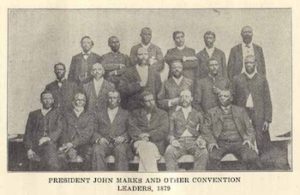
National Negro Convention 1879
*On this date in 1830, the first National Negro Convention met in Philadelphia, PA. This group gathered for the express purpose of abolishing slavery and improving the status of Blacks in America.
It started with a question. A question asked by a sixteen-year-old free Black named Hezekiel Grice. Grice, troubled by "the hopelessness of contending against oppression in the United States," wondered if Blacks should be encouraged to emigrate, en mass, to Canada. Such a question, he thought, should be carefully considered, so he proposed that a convention be held where the matter could be discussed. He wrote to several black leaders, who approved of the proposal, and on this date in 1830, the ten-day National Negro Convention began.
Forty Blacks from nine states attended the meeting, including Bishop Richard Allen. From the meeting emerged a new organization, the "American Society of Free People of Color, for improving their condition in the United States, for purchasing lands, and for the establishment of a settlement in the Province of Canada," of which Allen was named president. As can be taken from the society's descriptive title, the answer to Grice's original question was unclear. Yes, moving to Canada was encouraged, especially for blacks with children, but society also acknowledged the need to improve the lives of those who remained in America.
This first meeting of the National Negro Convention would initiate a trend that would continue for the next three decades. The formation of another organization called the "American Society of Free Persons of Labor" was recommended. This group would branch out to several states and hold their conventions. These, in turn, would lead to the formation of other organizations. The number of local, state, and national conventions blossomed to such a level that, in 1859, one paper would report that "colored conventions are almost as frequent as church meetings."
The Encyclopedia of African American Heritage
by Susan Altman
Copyright 1997, Facts on File, Inc. New York
ISBN 0-8160-3289-0